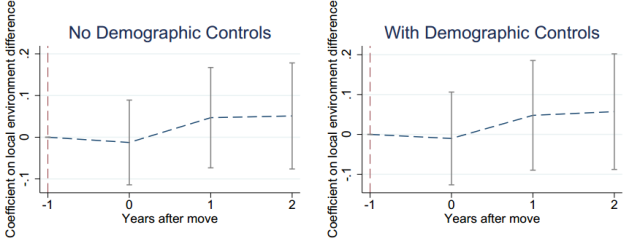{This post is mostly about a working paper by Hunt Allcott, Rebecca Diamond, and Jean-Pierre Dubé. I first saw this paper referenced in a twitter thread by Damon Jones. If this blog post seems too long, you could just go read that thread. It’s better anyway.}
Among the many inequalities in modern America is nutrition. The wealthy tend to eat healthier than the poor. Consumption of produce, sugar, and whole grains, vary in a stark way, with income. The poor also have significantly worse health outcomes, including significantly worse life expectancy.

Unless otherwise noted, all charts are from here.
Part of the reason for the poor diets might be because the ability to purchase food varies with income. Wealthy areas have three times more supermarkets then poor ones do. These also vary across racial lines, White neighborhoods have four times as many as predominantly black ones.
Lacking easy access to healthy food could have a negative impact on health, as residents turn to the only locally available food such as that sold mini marts and convince stores.
This isn’t a small group of people either, More than 2 million Americans, (about 2% of households) live over a mile from a grocery store, and have no access to a car. These areas lacking grocery stores are typically referred to as food deserts (although the definition seems to vary), and there are a bunch of them. You can find them on this map.
Getting rid of food deserts
Moreover, there seems an obvious solution, get supermarkets to open in places where there previously weren’t any. If opening grocery stores in poor parts of town increased health outcomes, one can imagine subsidizing their grocery stores in poor neighborhoods as an easy way to improve health outcomes. In fact, there are policies that do pretty much exactly this, other government initiatives to reduce food deserts include Michelle Obama’s Let’s Move program.
This assumes that having supermarkets nearby actually improves health.
There are a couple different ways to look at if access to grocery stores actually improves health, and a new working paper by Allcott, Diamond, and Dubé does both of them. The first is to look at how people’s purchasing behavior changes when a supermarket moves into their neighborhood. The second is to see how behavior changes when people move from neighborhoods with limited food options to those with more bountiful produce acquiring opportunities.
A new store comes to the neighborhood
So, what happens when a new store bursting with fresh fruits and vegetables moves into the sort of place that previously lacked these sorts of leafy delectables.

The first thing that happens is that people do start shopping at the new stores. The chart on the left hand shows that when a new store opens residents do indeed spend their grocery dollars at the new store, an impact that mostly happens in the first year after entry, before flatting off. Total grocery spending increases a bit, possibly indicating a slight change of spending that might have otherwise gone to convenience stores and the like.
What people decidedly do not do, is eat any healthier.

This chart shows a health index, which is a combined overall measure of how healthy purchased grociers are. The left chart shows the impact of how much healthy food consumption changed after a new store entered a neighborhood. The impact is pretty much zero. The chart on the right, is the same thing, but limited to zip codes that had previously lacked grocery stores. Again, there is no change in how healthy the food people are eating is.
Moving out of the Desert
The next test is to see what happens when people move from a part of town with a dearth of produce purveyors, to a neighborhood where the streets are paved with lettuce and municipal parks contain literal forests of broccoli. If these recent transplants suddenly binge out on vegetables, it’d be clear that their previous lack of consumption was due to where they lived.
Alcott, Diamond, and Dubé study this question by looking at how purchases change when people switch counties or zip codes. What happens, again, is nothing. Moving doesn’t really change what sorts of food you eat. People pretty much buy the same groceries, before and after they move[1].
Going to the grocery store
This lack of impact might not be too surprising. Just because you live in a neighborhood with no grocery store, it doesn’t necessarily mean you don’t shop at one. People who live far from a supermarket, still tend to make the trek to buy food.
The average distance to go shopping is 5.2 miles each way. Even those who live in food deserts, and don’t own a car travel an average of two miles to make a shopping trip.
Even the poor who live in food deserts still spend nearly as much of their food money at grocery stores as the wealthy do. The average household with an income of $70,000 spends 91 percent of their grocery budget at supermarkets, this is not that different the household that makes under $25,000, which spends 87 percent. So while it might be a pain in the ass to get to a grocery store if you live in a food desert, people seem to do it anyway.
Are food deserts meaningless?
Just because getting rid of food deserts doesn’t make people eat healthier, doesn’t mean there aren’t benefits. The biggest benefit is the convenience of not having to trek to some far away store.
The impacts studied here are relatively short term. If food purchasing habits are ingrained over a long period of time, such as the nearly two decades of childhood, living in a food desert for a few years might not impact purchasing decisions, but growing up in one might.
Still, if health is the goal, the policy focus should not be on eliminating food deserts. Alcott and Co. are not the first researchers to show that food deserts themselves aren’t really the cause of poor health among the poor. A better approach might be increase education about nutrition, or focus on poverty more generally.
Related PARTYSHEEPHATS posts
Should Developers be required to Include Parking?
How Much Would a Universal Basic Income Cost?
Sources, References, and Further Reading
The Geography of Poverty and Nutrition: Food Deserts and Food
Choices Across the United States
American Nutrition Association
Healthy Food Financing Initiative
[1] An example: one of our contributors has the unfortunate tendency of infuriating disreputable sous chefs and consequently he moves quite frequently. No matter what city he is currently hiding in this contributor lives nearly exclusively on a diet of orange Powerade and canned vegetarian chili. This might not be a representative experience.



Yay
Sent from my Verizon, Samsung Galaxy smartphone
LikeLike
Death will definitely prevent bad nutrition. Is there evidence that education about food nutrition would work? Doesn’t seem to have worked for government.
LikeLike